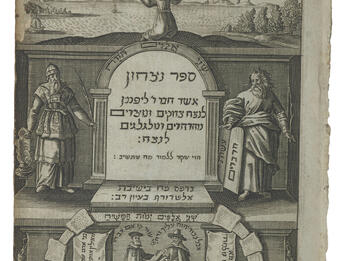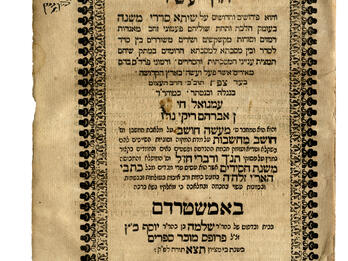Shirat dodi (Song of My Beloved)
Author’s Introduction
“An accepted custom in Israel has the status of a biblical command” [see Tosafot on b. Menaḥot 20b], and we are required to study it [see, e.g., b. Megillah 28a], in order to spread its scent around the world, which is supported by the Torah. Day to day they utter speech, and night to night [see Psalms 19:3] they pour out their hearts; when they sit in their homes and when they walk on the way [see Deuteronomy 6:7; 11:19] they follow the law of God; especially on the holy Sabbath day, they are engrossed in the Torah. Pious ones and men of action, the blessed seed, and many commoners gather together—not merely a few exceptional individuals—as the masses crowd ’round to read from the written Bible. And every wise-hearted man among them [see Exodus 35:10] opens the twenty-four chapters of tractate Shabbat, the day of rest [nofesh], and it shall be for him a restorer of life [nefesh; see Ruth 4:15], as the two words are comprised of the same letters, as are Mishnah and neshamah [soul].
Therefore, this man, who is like a breath [see Psalms 144:4], the servant Abraham, I am but dust and ashes (Genesis 18:27), I have come, by means of the scroll of a written book [see Psalms 40:8], of tractate Shabbat in poetic form, in meter, weight, and measure [see Leviticus 19:35]. From now on, whoever wishes to use this poem will find it available for him to fulfill his obligation on each and every Sabbath. I have incorporated into the poem the rulings of halakhah, so that he who reads it will know the true law in accordance with the halakhah, as I have seen pronounced by the scribes, its commentaries, who encamp around its edges. They are the owners of wheat, the twins of a gazelle (Song of Songs 4:5): the Rambam [Maimonides] and R. Ovadiah [Bartenura]. Whatever I have done is in accordance with their opinion, and I have trusted in the grace of God, that it will rise up and be accepted like a burnt offering: my head, my head [see 2 Kings 4:19], my sayings and utterances, for they include the commentary of the rabbis with regard to the ruling of law. This will make it easier for the reader to know the law while standing on one foot [see b. Shabbat 31a], and it will not be a burden to him, as people are naturally attracted to poetic verse. I have called this poem “Shirat dodi” (The Song of My Beloved; Isaiah 5:1), as the numerical value of dodi corresponds to the twenty-four chapters in tractate Shabbat.
You are now the blessed of the Lord (Genesis 26:29); please raise your voice and accept this portion from me [see Genesis 43:34], and let not the oppressed turn back in confusion (Psalms 74:21). May God listen to the voices of those who listen to my voice, for the bread of my song shall be as sweet to them as the taste of their food—may one eat and live forever [see Genesis 3:22].
Chapter 1: The Carryings out on the Sabbath
“The carryings out are two, and four within” [see m. Shabbat 1:1].
It would be too onerous to explain this at length—the general rule is that one who acts willingly is liable to excision, or to stoning if he was forewarned and picked up the item and also placed it down. If he performed only one of these actions, he is exempt, but it remains forbidden; if he did both unwittingly, he attains forgiveness through a sin offering.
And one should not perform any form of labor before praying, when it is near the time for minḥah [the afternoon service].
Credits
Published in: The Posen Library of Jewish Culture and Civilization, vol. 5.




